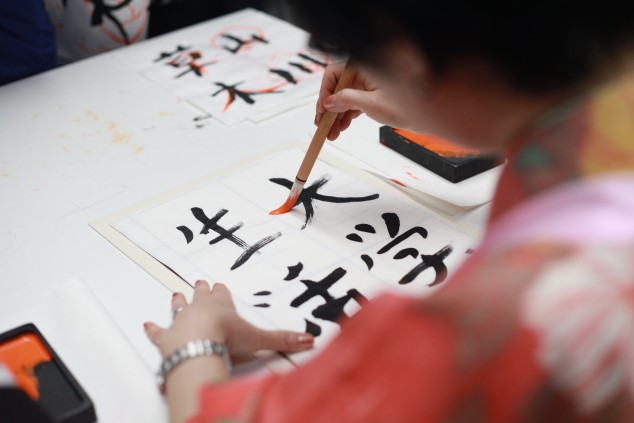In the series “Off Duty”, various members of the InterNations team share their personal stories about a global lifestyle and the international experience.
For this blog post, we’ve interviewed Laura, an expat from Romania. As part of our Community Support Team, she is responsible for looking after our 3.5 million members all over the world and serving as their first point of contact.
What even other team members might not know about her: Laura is actually fluent in Japanese after starting to teach herself in her teens.

How did you become interested in learning Japanese as a teenager?
Like many students of Japanese, I became interested in the language through popular culture. When I was about eleven, the first ever TV channel for anime launched in my home country, broadcasting Japanese cartoons with Romanian subtitles.
I’d always do my homework with the TV running in the background, and I was channel surfing one night when I came across this station. I’d never heard anyone speak Japanese before, and I found the way it sounded fascinating.
The thing with Japanese is that, even if you don’t understand anything, you can hear most of the sounds quite clearly: the language is entirely made up of syllables that always consist of a consonant and a vowel. You can pick up a lot, really fast, even if you don’t have any idea what you’re saying.
There and then I decided that this was what I was going to study.
And you simply started teaching yourself?
From that day, I was a bit obsessed. My parents bought me all the Japanese textbooks in Romanian they could find in my hometown. That’s all two or three of them: there weren’t too many good textbooks available.
Firstly, I’m not from the capital, but from a smaller town, Târgoviște. And secondly, this happened just before the Japanese pop culture boom in Romania when everyone was suddenly into Japanese food, fashion, martial arts, J-dramas, and so on. Today, you can probably find better resources for language learning, but I had to rely on those three books, the anime channel, and the internet to teach myself Japanese for five years.
It’s hard if you don’t have anyone to guide you, for example due to the various writing systems. As a teenager, I managed to learn two of them on my own: hiragana and katana, the two syllabaries, with around 46 characters each. This turned out to a be huge bonus in my first year at university, as our professors expected us to master them in two weeks!
Before starting university, I’d become pretty good at colloquial Japanese, but I didn’t have a clue about grammar.

The Japanese writing system is a huge challenge for language students.
What exactly was your degree course in?
I got a degree in East Asian studies focusing on Japanese language, literature, and culture from the University of Bucharest. I minored in English, but more than half of my daily classes were in some way related to Japan, with a lot of language lessons. I discovered that I quite like Japanese grammar — it might even have ruined me for learning other languages! It’s just so different from any other language I’m familiar with.
Japanese is an “agglutinative” language, which means that, for example, you don’t conjugate verbs quite like you would in Romanian. You just cut off bits at the end and then keep adding new stuff. Like yomu (to read) becomes yomimasu, a polite way of saying “I read”, “you read”, and so on, which becomes yomimashita, which is “I read”, “you read”, etc. in the past tense. Technically speaking, it’s not even a tense as Japanese doesn’t have any tenses, just grammatical aspects, which is a different category.
Those endings don’t just change the meaning; they also indicate politeness. As a rule of thumb, if you make a Japanese word very, very long, It’s also very, very polite.
In general, I just like how you express things in polite Japanese. You never do it directly, but in a rather roundabout way. You don’t say, “Oh, let me do this for you!”. You say, “Would you please allow me to do this for you?” It’s as if you don’t want to put any pressure on the other person, and I appreciate this indirect approach.
Are there also particular parts of Japanese culture that you are interested in?
Apart from this way of interacting with other people, the general sense of politeness and social niceties, I like many of the Japanese principles as they relate to arts and crafts: the aesthetics of beauty and serenity in things like arranging flowers, origami, or furoshiki, the traditional art of wrapping gifts in a square piece of cloth.
But Japanese pop culture is still my passion. Theoretically, I could now watch my favorite TV shows without subtitles, but I’m not allowed to switch them off as my boyfriend doesn’t speak Japanese.

Did you also get to live in Japan during your studies?
Unfortunately, I haven’t yet had the opportunity for a long-term stay, though I’ve been to Japan several times. My university didn’t provide an academic exchange program. What they did offer was a short homestay to prepare for the N2 JLPT, the second-most difficult level of the official Japanese Language Proficiency Test.
I lived with a Japanese host family for two weeks, and they are the nicest people I’ve ever met — it’s been over five years, and we’re still in touch. They picked me up at the airport, and on the very first day, they asked me to call them “mum”, dad”, and “big sister”. Actually, I still do, and my mum sometimes gets upset when I talk about my “other mum” in Tokyo.
I spent most of the time with her since she’s a stay-at-home mother, while my Japanese dad and sister were both working. She took me on a tour of their neighborhood, showed me around the city, and cooked Japanese dishes for me. We still send each other Facebook messages regularly, which occasionally make me tear up when she says things like, “You’ll always be our honorary daughter.” My big sister has gotten married and now has two wonderful children. She often sends me pictures of them, and she’s quite the star on Japanese Instagram.
While it’s true that Japanese people are usually very polite, there’s also this stereotype that they might be a little cool or distant, but this hasn’t been my experience at all. My host family was so warm and kind-hearted right from the start — they’re just great, and I love them!
Did your trips to Japan also force you to leave your personal comfort zone in some ways?
Though this was only a short trip, it seemed somewhat daunting. I was already in my early 20s, but I’d never gone abroad on my own. Also, I’d never been on a long-distance flight before, and honestly, I’m really scared of flying. I was assigned a window seat during check-in, and believe me, you don’t want that window seat if you’re afraid of flying and there’s no one to hold your hand! I did have to step outside my personal comfort zone in this sense, I guess.
However, Japan is a very good destination for a first trip on your own. Even if my host family hadn’t been at the airport, I wouldn’t have had any problems. One cliché about being a tourist in Japan is asking someone for directions and them just taking you by the hand to show you around — but I actually had that happen to me. This probably gives you the wrong impression for any future trips, as you might start thinking it’s just as easy everywhere else in the world.

Do you get the opportunity to keep up with your Japanese?
I’m still trying to practice my language skills. The problem with learning Japanese, as well as other East Asian languages, is that it doesn’t really end. With English or French, there was a point when I felt able to say, “Okay, that’s it. I’m fluent.” In Japanese, you simply can’t stop. If it’s not your native language, there’s this constant pressure to keep learning.
There’s always an endless supply of kanji (the adopted Chinese characters), for example. You can’t know all of them — the Japanese themselves don’t know all of them! If you learn about 2,000, you can read most newspapers, magazines, and contemporary literature, though.
I’d very much like to get the N1 certificate for the highest level of linguistic competence in Japanese. I’ve taken the N1 exam before, but unfortunately, I didn’t pass — I was exactly one point away from making it. If only I’d had 50 points too few, I could have said I simply wasn’t ready yet, but missing the required test score by one point? That’s just upsetting!
Therefore, I really want to try again this year. There are only two official dates annually, one in July and one in December, so I’m aiming for the latter. Overseas — outside of Japan — it’s only held in selected cities, and Munich isn’t even among them: I’ll probably have to go to Stuttgart for the exam.
The N1 has a strong focus on polite speech and business Japanese, which is a lot harder than everyday language usage. At least, it features “only” 2,000 kanji and you get a list in advance, so they can’t surprise you by sneaking in something completely obscure.

Can you also put your language skills to good use in your job?
Sadly, I don’t have that many chances to use Japanese at work. I sometimes get to translate messages we receive from members. But foreign languages in general are very helpful for my job as I can understand most of what our members write if it’s in a language other than English.
Apart from Romanian, I speak English, Japanese, French, Spanish, Korean, and German at varying degrees of fluency, and I can also understand Italian and Portuguese, so I rarely need to rely on Google Translate. It’s especially useful if our members don’t feel that confident at expressing themselves in another language, so I can really help to make their customer support experience easier.
Generally speaking, I don’t just consider myself an expat — I do think I’m a global mind. Apart from speaking several languages, I feel very comfortable interacting with people from other countries, and I’ve always been interested in learning more about other cultures. I knew from previous experience that I enjoy working in an international environment. This is the number one reason why I applied here.
I also attend InterNations Activities whenever I can — I prefer smaller groups for doing something specific together to parties or clubbing. I’m obviously a big fan of the Munich Japanese Culture Group, as well as the Card and Board Games Group and the Pub Quiz Explorers Group.

Cherry blossoms are the symbol of springtime in Japan.
Do you have any plans for future travels to Japan?
I’m planning another trip to Japan for next year. I’d like to explore some smaller towns and the countryside. It’s another one of those clichés, but I really, really want to see the cherry trees in full bloom. The last time I went to Japan two years ago, I’d planned my entire trip around sakura season. And then it started early that year, and I missed it by just a few days!
Photo credits: InterNations / iStockphoto / Pexels